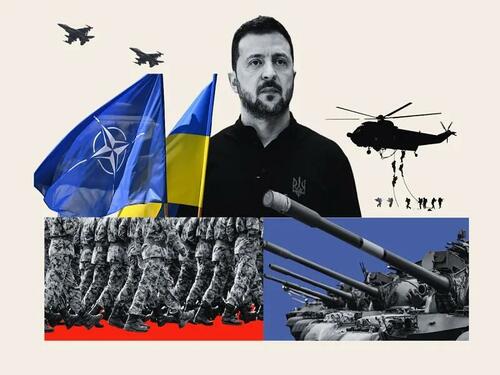Authored by Andrew Korybko via substack,
Ukraine will still remain a de facto member of NATO so long as its security guarantees with the bloc’s members remain in effect.
Zelensky recently flip-flopped on ceasefire terms by signaling that he’d accept a cessation of hostilities in exchange for Ukraine being admitted to NATO, though without Article 5 applying to all the territory that he claims as his own while the conflict remains ongoing. The Ukrainian Foreign Ministry then released a statement about how their country won’t accept any alternative to NATO membership. The Kremlin predictably described this demand as unacceptable.
This coincided with NATO Secretary General Rutte clarifying that his bloc’s focus right now is on arming Ukraine, which corroborated reports from Le Monde that several members such as Hungary, Germany, and even the US oppose Ukraine joining at this time. The larger context concerns Putin finally climbing the escalation ladder after authorizing the historic use of the hypersonic medium-range MIRV-capable Oreshnik missile in combat after the US let Ukraine use its ATACMS inside of Russia’s pre-2014 territory.
Nevertheless, what’s lost amidst the latest news about Zelensky’s flip-flop on ceasefire terms is the fact that this is actually just a faux concession since there isn’t any chance that he’ll capture all of his country’s lost territory, plus he’s still demanding NATO membership, which is at the root of this conflict. At the same time, Ukraine is already arguably a de facto member of NATO after clinching a spree of security guarantees with many of its members over the past year, which resemble Article 5 in spirit.
About that, this clause is popularly misportrayed as obligating countries to dispatch troops in support of allies that are under attack, though it only actually obligates them to provide whatever support they deem necessary. The security guarantees that it clinched institutionalize those countries’ existing support for Ukraine in the form of arms, intelligence sharing, and other aid, which is essentially the same as Article 5 but without any implied (key word) pressure to dispatch troops like full membership carries.
So long as these agreements remain in force, then freezing the conflict even without Ukraine formally joining NATO would still represent Russia’s acceptance of its de facto membership as explained, though it’ll be very difficult for Russia to get Ukraine to terminate these pacts and for its partners to accept that. Germany’s and the UK’s allow for termination within six months of notification without any strings attached, while Poland’s the US’ specify that ongoing and implementing agreements will remain in force.
Per the first, “The termination will not affect the implementation of ongoing activities or projects, which have been decided prior to the date of its termination, unless Ukraine and Poland decide otherwise”, while the second states that “any implementing agreement or arrangement entered into between the Parties consistent with the terms of this Agreement shall continue to remain in effect under its own terms, unless otherwise specified in the terms of the specific implementing agreement or arrangement.”
In other words, even in the unlikely event that Russia coerces Zelensky or whoever his successor might be into terminating these pacts, Poland and the US might still unilaterally implement parts of them per their legal interpretations. This could hypothetically take the form of them carving out a proxy state in Western Ukraine on national security pretexts in order to prevent the deployment of Russian troops on NATO’s borders if the national government somehow falls under the Kremlin’s influence.
Granted, they’d have to have the political will to actually deploy troops to the country and it’s unclear whether they’d be willing to risk World War III over this if the Kremlin signaled that it has the political will to strike those of their troops that might officially enter Ukraine, but it still can’t be ruled out. Accordingly, most emerging scenarios of this conflict’s endgame lean towards Ukraine’s security guarantees with NATO remaining in effect, thus amounting to its continued de facto membership.
The only way in which this can be avoided is if Russia achieves a military breakthrough that enables it to coerce Zelensky or whoever his successor might be into terminating these pacts and the West (chiefly the US and Poland) is either deterred from staging a conventional military intervention, retreats under Russian attack if they go through with it, or are decisively defeated there in a hot war that somehow doesn’t go nuclear. This sequence of events is unlikely to unfold barring some unforeseen development.
Accordingly, even if Russia achieves its four maximalist aims of restoring Ukraine’s constitutional neutrality, demilitarizing that country, denazifying it, and having Kiev recognize the loss of its five former regions, Ukraine will still remain a de facto member of NATO if these security guarantees remain in force.
Zelensky therefore isn’t conceding anything significant by flip-flopping on ceasefire terms. Russia will either accept this new military-strategic reality or it’ll have to resort to brinksmanship to try to change it.
Source link


